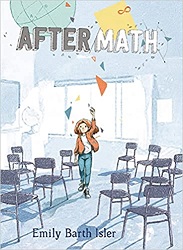
 AfterMath
AfterMathReview posted February 11, 2022.
Carolrhoda Books, 2021. 266 pages.
Review written December 1, 2021, from my own copy
Starred Review
2022 Mathical Book Prize Winner, Grades 6-8
I just finished an audiobook written in 2021 that was also about families torn apart after a school shooting. That one, too, had a main character whose brother had done the shooting and who was ostracized by her classmates. How much do I hate it that this topic is timely in America today? However, I love it that kids can process these timely issues in the safe space of fiction written for them.
In AfterMath, twelve-year-old Lucy has just moved to a new town, not far from the one she left, but with a whole new school. Her parents couldn’t bring themselves to stay in the home where her little brother Theo died at five years old from a heart defect.
Her parents choose to move from Maryland to a town in Virginia where there was a school shooting three years ago. A house is for sale at an inexpensive price (one of the kids who died lived in that house), and they think Lucy will be comforted to be around other grieving people – or something?
Everything at her new school is shaped by the shooting. People introduce themselves by telling Lucy where they were during the shooting. And they aren’t very welcoming. There’s only one table in the lunchroom with empty seats, and later people tell Lucy that she shouldn’t sit with Avery. It turns out that Avery’s half-brother was the one who did the shooting.
But Lucy finds a friend in Avery. And an environment where she’s not the freak because her brother died. People don’t even know about Theo.
Lucy’s favorite class has long been Math, finding that to be something that has certainty in an uncertain world. So she loves it when someone starts sending her math jokes such as:
What kind of angle should you never argue with?
A 90-degree angle. They’re ALWAYS right.
And when her math teacher tells her about an after-school class in mime, she somewhat reluctantly signs up. It turns out that learning to express yourself without words also helps you express yourself with words.
I thought this book approached a tough subject with nice balance. Because Lucy’s an outsider, she can see things about the shooting survivors that an insider might not see. But because she’s grieving herself, she has a more vulnerable outlook. I like the way her parents are portrayed – clueless and making many mistakes in some areas, but loving and genuinely trying to do what’s best for Lucy.
Lucy, her friends, and her parents all show character growth in this book.
The one downside is I’m not sure who I’d give this beautiful book to. Except that impulse comes from thinking kids aren’t already thinking about school shootings. Here’s me fervently hoping someday this will be a historical curiosity.
P.S. I'm posting this on February 10, 2022, and now I can freely say how happy I was to help choose this book as our 2022 Mathical Book Prize Winner for grades 6-8! The math aspect is a fundamental part of the book, and readers can see math actually helping with healing and coping.
